
Global Ecology and Conservation
Scope & Guideline
Empowering conservation through open-access research.
Introduction
Aims and Scopes
- Biodiversity Conservation:
The journal emphasizes research aimed at understanding and conserving biodiversity at various scales, including species, populations, and ecosystems. This includes studies on endangered species, habitat loss, and the effectiveness of conservation strategies. - Ecosystem Services:
Research on the relationship between ecosystems and human well-being is a core focus. This includes assessing how ecosystem services can be managed and conserved to benefit both nature and society. - Climate Change Impacts:
The journal publishes studies that explore the effects of climate change on various ecological processes and species distributions, as well as strategies for mitigation and adaptation in conservation practices. - Human-Wildlife Interactions:
Understanding the dynamics of human-wildlife interactions is crucial for effective conservation. The journal includes research on conflict mitigation, community perceptions, and the role of local communities in conservation efforts. - Ecological Modeling and Monitoring:
The use of ecological modeling, remote sensing, and innovative data collection methods (such as eDNA and citizen science) to monitor biodiversity and assess conservation outcomes is a significant area of interest. - Restoration Ecology:
The journal encourages research on ecological restoration practices, including the restoration of degraded habitats and the reintroduction of species, to enhance biodiversity and ecosystem resilience.
Trending and Emerging
- Interdisciplinary Approaches to Conservation:
There is an increasing trend towards integrating social sciences with ecological research to address conservation challenges. This includes understanding community values, economic factors, and cultural contexts that influence conservation outcomes. - Technological Innovations in Monitoring:
The use of advanced technologies, such as remote sensing, environmental DNA (eDNA), and machine learning, for biodiversity monitoring and conservation planning is on the rise. These tools are enhancing the ability to collect and analyze ecological data more efficiently. - Restoration Ecology and Climate Resilience:
Research focusing on ecological restoration as a means to enhance climate resilience is gaining traction. This includes studies on restoring ecosystems to mitigate the impacts of climate change and improve biodiversity. - Community Engagement and Citizen Science:
There is a growing emphasis on involving local communities and citizen scientists in conservation efforts. Studies that highlight participatory approaches and local knowledge have become more prevalent, reflecting a shift towards inclusive conservation practices. - Ecosystem-Based Management:
The journal is increasingly publishing research that advocates for ecosystem-based management strategies, which consider the interconnectedness of species and habitats, rather than isolated management practices.
Declining or Waning
- Traditional Species-Focused Conservation:
There is a noticeable shift away from purely species-centric conservation studies towards more holistic approaches that incorporate ecosystem dynamics and human interactions. This trend suggests a waning emphasis on isolated species studies. - Invasive Species Research:
Although still relevant, the frequency of papers solely focused on invasive species management appears to be declining. The current trend favors integrated management strategies that consider ecological context rather than focusing on invasive species alone. - Laboratory-Based Studies:
Research conducted in controlled laboratory settings is becoming less prevalent compared to field studies. The emphasis is shifting towards understanding ecological processes in real-world contexts, which may lead to less focus on laboratory research. - Local Case Studies:
There seems to be a reduction in the number of localized case studies that do not contribute to broader ecological theories or frameworks. The journal is increasingly favoring studies that have implications for global conservation strategies.
Similar Journals
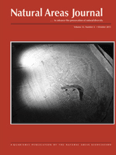
NATURAL AREAS JOURNAL
Advancing Knowledge for Nature's PreservationNATURAL AREAS JOURNAL, published by the NATURAL AREAS ASSOCIATION, serves as a vital resource for scholars and practitioners in the fields of ecology and nature conservation. Since its inception in 1993, this quarterly academic journal delivers original research, case studies, and reviews that focus on the preservation of natural areas and the intricate relationships within ecosystems. The journal, indexed under ISSN 0885-8608 and E-ISSN 2162-4399, currently holds a Q3 quartile ranking in both Ecology and Nature and Landscape Conservation as of 2023, reflecting its commitment to advancing knowledge in these essential areas. With Scopus rankings placing it at the 39th percentile in Nature and Landscape Conservation and 36th in Ecology, the NATURAL AREAS JOURNAL is an influential platform that fosters interdisciplinary collaboration and advocacy for conservation efforts. Although it currently does not offer Open Access options, its contributions are pivotal for researchers, professionals, and students seeking to explore, understand, and contribute to conservation science.

Ecosistemas
Bridging knowledge and action for ecological resilience.Ecosistemas is a prominent Open Access journal published by the ASOCIACION ESPANOLA ECOLOGIA TERRESTRE, specializing in the field of ecology. Since its inception in 2001, it has dedicated itself to advancing ecological knowledge and research, fostering an inclusive platform for the dissemination of cutting-edge studies that span ecological interactions, sustainability, and biodiversity. The journal, based in Spain, has established its reputation with notable rankings such as Q3 in the field of Ecology and Q4 in Ecology, Evolution, Behavior, and Systematics, reflecting its commitment to quality research. With a Scopus Ranks position placing it in the 40th and 37th percentiles for its categories, Ecosistemas is integral to the academic community, serving researchers, professionals, and students alike. It provides a vital resource for those seeking to understand ecological dynamics and environmental challenges, facilitating open access to important findings and discussions that shape the future of our ecosystems.
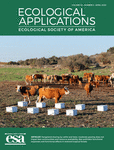
ECOLOGICAL APPLICATIONS
Connecting research to conservation for impactful change.ECOLOGICAL APPLICATIONS, published by WILEY, is a leading journal in the field of ecology, providing a platform for innovative research that addresses the understanding and management of ecological systems. With an ISSN of 1051-0761 and E-ISSN of 1939-5582, it has established itself as a vital resource for ecologists and environmental scientists since its inception in 1991. Ranked in the top quartile (Q1) for Ecology in 2023 and with a Scopus ranking of 40 out of 461 in Environmental Science, ECOLOGICAL APPLICATIONS boasts an impressive impact factor, attesting to its significance and influence in the field. The journal's mission is to publish peer-reviewed articles that contribute to ecological theory and its applications in conservation and environmental management. Researchers, professionals, and students alike will find invaluable insights and the latest developments in ecological research through its comprehensive scope and rigorous scholarship, ensuring a crucial role in shaping future ecological practices and policies.

Folia Oecologica
Exploring the Intersection of Ecology and Agriculture.Folia Oecologica is a distinguished open-access journal published by WALTER DE GRUYTER GMBH, focusing on critical research in the fields of agricultural and biological sciences, ecology, and forestry. Established as a vital platform for the dissemination of knowledge, this journal has been providing free access to its valuable content since 2017, catering to an international audience engaged in environmental and ecological studies. With its ISSN 1336-5266 and E-ISSN 1338-7014, Folia Oecologica has earned notable ranks in Scopus, placing it in the 62nd percentile for Agricultural and Biological Sciences and the 50th percentile for Environmental Science. The journal's commitment to high-quality research is reflected in its positions in the Q2 and Q3 quartiles across various categories in 2023. As it converges years from 2006 to 2024, Folia Oecologica continues to foster scholarly dialogue and collaboration among researchers, professionals, and students, making significant contributions to the understanding and preservation of our ecological systems.
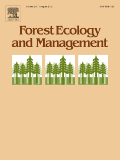
FOREST ECOLOGY AND MANAGEMENT
Navigating the Future of Forest ManagementFOREST ECOLOGY AND MANAGEMENT is a premier peer-reviewed journal dedicated to the integral study of forest ecosystems and their management, published by Elsevier in the Netherlands. With an impactful presence in the field, this journal boasts a prestigious Q1 ranking in multiple categories, including Forestry, Management, Monitoring, Policy and Law, and Nature and Landscape Conservation as of 2023. It addresses key issues relevant to sustainable forest practices, conservation strategies, and environmental monitoring, making it a vital resource for researchers, practitioners, and policymakers alike. The journal is indexed with an impressive Scopus rank, placing it among the top tier of titles in Agricultural and Biological Sciences and Environmental Science. While it does not offer Open Access options, its rigorous review process and high visibility make it essential for those seeking to stay abreast of the latest findings and trends in forest ecology and management. Published continuously since 1976, FOREST ECOLOGY AND MANAGEMENT aims to foster interdisciplinary collaboration and advance knowledge critical to the stewardship of forest resources in an ever-changing global landscape.
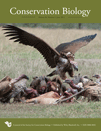
CONSERVATION BIOLOGY
Fostering global dialogue on pressing environmental challenges.CONSERVATION BIOLOGY, published by Wiley, is a leading journal in the field of ecology and conservation, with a focus on disseminating high-quality research that addresses pressing environmental challenges. With a strong impact factor and categorized in the top quartile (Q1) across various relevant fields including Ecology, Evolution, Behavior and Systematics, and Nature and Landscape Conservation, the journal plays a pivotal role in advancing the scientific understanding of biodiversity and conservation practices. Since its establishment in 1987, CONSERVATION BIOLOGY has provided a vital platform for researchers, professionals, and students to share innovative findings and facilitate discussions surrounding ecological sustainability and conservation strategies. Although it is not an open-access publication, it ensures that a wide range of significant research is accessible to the global scientific community. The journal’s rigorous peer-review process and reputation for excellence make it an essential resource for anyone involved in the study of ecology and conservation.

RUSSIAN JOURNAL OF ECOLOGY
Unveiling Insights into Russia's Diverse EcosystemsRUSSIAN JOURNAL OF ECOLOGY, published by PLEIADES PUBLISHING INC, stands as a critical resource within the field of ecology, offering an array of research insights that span various ecological topics. With an ISSN of 1067-4136 and an E-ISSN of 1608-3334, this journal has been consistently disseminating knowledge since its inception in 1996, now converging towards 2024. Despite its current Q4 ranking in the Ecology, Evolution, Behavior and Systematics category, the journal has carved out a niche in the publication landscape, particularly for scholars focused on the rich and diverse ecological phenomena of Russia and surrounding territories. The journal aims to foster interdisciplinary collaboration and innovation by providing a platform for the dissemination of high-quality research. While it currently lacks open access options, readers can expect in-depth studies and analytical discourses that contribute meaningfully to the global understanding of ecological systems. With an impressive Scopus rank, this journal remains an important outlet for researchers, professionals, and students committed to advancing ecological science.

BIODIVERSITY AND CONSERVATION
Advancing knowledge for a sustainable future.Biodiversity and Conservation is a leading peer-reviewed journal published by Springer, dedicated to advancing the understanding of biodiversity and the critical aspects of conservation biology. With an impact factor that consistently places it in the Q1 category across multiple fields including Ecology, Evolution, and Nature and Landscape Conservation, this journal serves as a vital resource for researchers, professionals, and students who aim to address the pressing challenges of biodiversity loss and ecosystem management. Established in 1992, the journal has successfully created a platform for high-quality research and innovative approaches, facilitating the dissemination of knowledge that informs conservation practices globally. With a strong ranking in Scopus, it highlights the importance of rigorous scientific inquiry in the preservation of our natural world. Subscribers can access a wealth of articles that encompass a broad range of topics pertinent to both theoretical and practical aspects of biodiversity, encouraging an interdisciplinary dialogue among the diverse fields of environmental science and conservation.
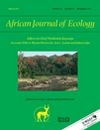
AFRICAN JOURNAL OF ECOLOGY
Illuminating Ecological Dynamics Across the ContinentThe African Journal of Ecology, published by Wiley, is a leading academic journal in the field of Ecology, Evolution, Behavior, and Systematics. Established in 1963 and continuing its vital contributions to the field until 2024, this journal serves as a premier platform for researchers and scholars to share groundbreaking studies that explore the intricate relationships within ecosystems, particularly in the African context. With an impressive Scopus Rank of #423 out of 721 and a Q3 Quartile ranking, it stands as a credible source of scholarly information, gaining recognition among peers for its rigorous peer-review process and impactful publications. While the journal is not open access, it remains influential in driving advancements in ecological research and providing insights vital for conservation efforts and biodiversity studies. Authors and readers alike will find that the African Journal of Ecology not only promotes scientific inquiry but also fosters a deeper understanding of ecological dynamics that affect our world.
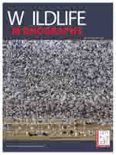
WILDLIFE MONOGRAPHS
Championing impactful research in wildlife conservation.WILDLIFE MONOGRAPHS, published by WILEY, is a prestigious journal dedicated to advancing the understanding of ecological and biological sciences with a keen focus on wildlife conservation and management. With an ISSN of 0084-0173 and an E-ISSN of 1938-5455, this journal has established itself as a leader in its field, ranking in the Q1 quartile for both Ecology, Evolution, Behavior and Systematics and Nature and Landscape Conservation in 2023. The journal's remarkable impact is underscored by its Scopus rankings—46th out of 721 in Agricultural and Biological Sciences and 17th out of 211 in Environmental Science, highlighting the journal's influential role in shaping research discussions and policy in wildlife management. Available in print and online, WILDLIFE MONOGRAPHS publishes comprehensive studies that inform practitioners, researchers, and students alike, fostering a deeper insight into biodiversity and ecosystem dynamics. Founded in 1981, the journal continues to evolve, contributing significantly to the scientific community through rigorous peer-reviewed articles that bridge the gap between theory and practical application in wildlife management.